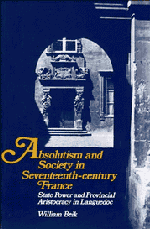 Absolutism and Society in Seventeenth-Century France
Absolutism and Society in Seventeenth-Century France Book contents
- Frontmatter
- Contents
- List of tables
- List of figures
- Preface
- List of abbreviations
- Map: Languedoc in the seventeenth century
- PART ONE INTRODUCTION
- 1 Absolutism and class
- 2 Languedoc and its rulers
- PART TWO THE DISTRIBUTION OF AUTHORITY
- PART THREE THE PROVINCE ON ITS OWN
- PART FOUR THE PROVINCE AND THE CROWN
- Conclusion
- Appendix: Breakdown of taxes from the diocese of Toulouse, 1677
- Select bibliography
- Index
2 - Languedoc and its rulers
Published online by Cambridge University Press: 05 July 2011
- Frontmatter
- Contents
- List of tables
- List of figures
- Preface
- List of abbreviations
- Map: Languedoc in the seventeenth century
- PART ONE INTRODUCTION
- 1 Absolutism and class
- 2 Languedoc and its rulers
- PART TWO THE DISTRIBUTION OF AUTHORITY
- PART THREE THE PROVINCE ON ITS OWN
- PART FOUR THE PROVINCE AND THE CROWN
- Conclusion
- Appendix: Breakdown of taxes from the diocese of Toulouse, 1677
- Select bibliography
- Index
Summary
In the seventeenth century Languedoc covered slightly less than 10 percent of the territory controlled by the king and held between 7 and 8 percent of the royal subjects. It was the largest province in France except for Guyenne, and its total population was surpassed only by Normandy, Brittany, and Guyenne. It was thus the most extensive province with estates, although not the most densely populated. It usually supplied between 6 and 9 percent of the king's revenues.
Within this large area a tiny elite of powerful individuals – at the most one-tenth of 1 percent of the population – held all the important posts and wielded all significant authority. It is this political class, assumed to belong to a broader ruling class, whose activity will tell us about the nature of absolutism in Languedoc. The sources for their activities are documents in which institutional agents recorded or discussed governmental business. Each institutional point of view has a biased angle of vision, but collectively they provide a multi-dimensional picture in which the distortions of one are corrected by the criticisms of another. Through these sources we get a veritable panorama of issues and controversies from which to determine what the most important concerns were and what aristocratic leaders thought about them. But whose concerns were these? A ruling class should include everyone with similar relations to the system of production, and not just prominent individuals who acted politically.
- Type
- Chapter
- Information
- Absolutism and Society in Seventeenth-Century FranceState Power and Provincial Aristocracy in Languedoc, pp. 34 - 56Publisher: Cambridge University PressPrint publication year: 1985


